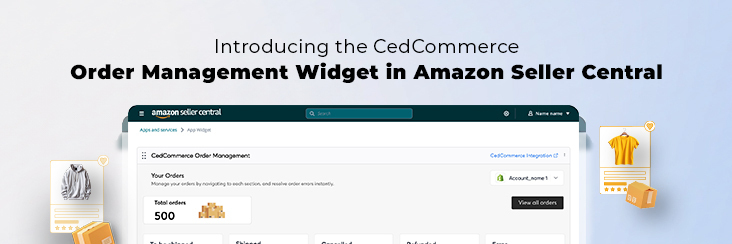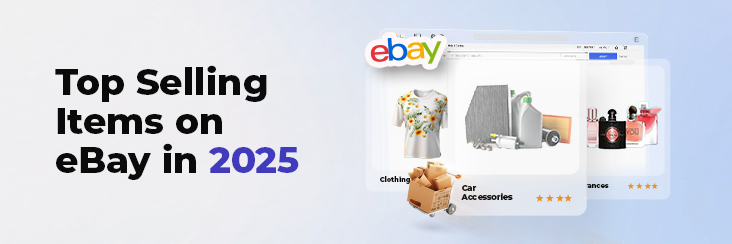Walmart Embraces Amazon MCF: A New Era of Cross-Platform Fulfillment for eCommerce
Walmart Embraces Amazon MCF: A New Era of Cross-Platform Fulfillment for eCommerce
Online marketplaces have completely transformed the way eCommerce operates. They could be worth as much as $7 trillion in sales by 2024. It explains how the need for multi-vendor eCommerce marketplaces has grown over the past several years, and the trend will surely continue to grow, luring more businesses to speed up their sales funnels.
So, if you want to step up your eCommerce game, now is the time to invest in the advanced technological stack and create a multi-vendor marketplace website.
A multi-vendor marketplace platform is a one-place-find-all solution to creating an online marketplace. Here, customers can find an extensive range of products from varying niches. Consequently, grocery and healthcare marketplaces have emerged quite popular during the pandemic.
Read our blog to learn more about the future of online marketplaces.
The big four—Taobao, Tmall, Amazon, and JD.com—alone accounted for an astounding 77% of the entire GMV (Gross Merchandise Value) generated by the Top 100 online marketplaces worldwide.
Multi-vendor marketplaces enable sellers to sell a variety of products. Vendors can sell at competitive prices compared to single-vendor, retailer-specific online stores. More importantly, a multi-vendor marketplace platform allows businesses to reach a larger audience. As compared to their counterparts, physical stores don’t deliver similar benefits.
According to Statista, 47% of digital purchases globally have happened via online marketplaces.
Enterprise marketplaces are growing in popularity. If you, too, are planning on launching an enterprise marketplace, we bring you the enterprise marketplace guide. Click on the link below to get the guide for free and explore the strategic direction toward a successful launch, best practices, key recommendations, and more.
Today, we bring you some of the most popular online marketplace examples. So, what are we waiting for? Let’s discover the best for your eCommerce business.
Eggs-traordinary Easter Sale 2023 – Flat 20% OFF on all our Magento Marketplace solutions till 23rd April 2023. Click below to view our offer:
Online marketplaces present merchants with an excellent opportunity to onboard the platform. Vendors can list their products and start selling and they don’t have to worry about warehousing, shipping, or marketing costs.
Also read: Building trust for your online marketplace
Multi-vendor marketplace platforms present ready-to-use solutions for building online marketplaces from scratch. They connect merchants and buyers to exchange a transaction on a common platform and act as digital spaces for sellers to sell their products. Furthermore, these platforms are packed with basic eCommerce functionalities and you get access to integrations, essential to streamline marketplace operations.
Also read: Top online marketplace ideas for entrepreneurs in 2022
Also read: How to choose the ideal enterprise eCommerce platform?
We have listed the top 10 most popular multi-vendor marketplace software. In addition, we’ve also compiled their basic and advanced functionalities, their benefits, and drawbacks.
Online marketplaces create a win-win situation for marketplace owners, vendors, and customers. Marketplace owners can build a diversified monetization model with an online marketplace while vendors get more opportunities to scale their business compared to eCommerce stores. On the other hand, customers also get access to multiple products on a single platform.
The best multi-vendor marketplace platform enables carrying out eCommerce activities smoothly and helps you adjust to market fluctuations and changes in consumer behavior.
Magento is one of the most powerful eCommerce marketplace platforms built on open-source technology. It makes the source code accessible, which you can modify as per your requirements. The platform is available in Community Edition and Enterprise Edition and is considered one of the best online marketplace examples since it accommodates both front-end and back-end development.
Also read: Top multivendor marketplace extensions for Magento 2
Our Magento marketplace extension can transform your eCommerce store into a feature-rich marketplace. Moreover, you get a free, open-source platform to start a multi-vendor store with Magento, along with various paid plugins. More importantly, it is easy to get started if you have extensive knowledge of developing using Magento.
Learn more about the exclusive features of Adobe Commerce
Read the blog
Find out how Adobe Commerce can help you nurture brand relationships
Read the blog
Magento is indeed the ultimate eCommerce platform, however, there are some limitations:
Are you planning on starting your online marketplace? Or do you wish to bring your offline business online? You can easily convert your website into a full-fledged marketplace with the flexible, adaptive, and future-ready Multi-Vendor Marketplace Extension from CedCommerce.
Moreover, our Magento marketplace extension is built for your convenience which you can avail at the most affordable prices. Pay only once and get the solution for a lifetime.
Click on the link below to learn more about our solution’s features
Our association with Adobe speaks for our efforts. We are:
B2C Marketplace Platform
B2B Marketplace Solution
Online Marketplace Solution
Marketplace Platinum Package
Adobe Commerce Development Services
PWA Development
Hire Magento Developers
Hyva Theme Development
Shopify is one of the leading multi-vendor marketplace platforms. It offers a quick and easy solution to transform your single-seller store into a multi-vendor marketplace. Moreover, Shopify comes with a POS system. It also enables easy and quick integrations for shipping and marketing. You get access to various apps for different marketplace use cases. It’s budget-friendly and comes with an easy-to-use interface. Therefore, with all the features and functionalities, Shopify has grown to become a popular multi-vendor marketplace platform.
Source: BuiltWith
Here are some of the most prominent reasons you should go for Shopify:
WooCommerce is a popular WordPress plugin used by small and large online businesses. It’s a flexible and open-source WordPress plugin and offers all the basic and advanced functionalities of WordPress. You get tons of themes to customize your online marketplace.
The eCommerce platform also gives you the flexibility to sell multiple product types. These include virtual, downloadable, and physical products on the marketplace. As an easy-to-use plugin for those with prior experience working on WordPress, it suits businesses that wish to add marketplace functionalities to their WordPress websites.
Benefits that establish WooCommerce as one of the best multi-vendor marketplace platforms:
Here are some of the primary drawbacks of WooCommerce:
Sharetribe is a cloud-based eCommerce platform. It enables merchants to build a customizable multi-vendor marketplace. As a SaaS-based, hosted marketplace solution featuring a subscription-based business model, Sharetribe comprises two products, including Sharetribe Go and Sharetribe Flex.
Sharetribe Go is a scalable eCommerce marketplace platform. It does not require coding skills to build a marketplace. At the same time, Sharetribe Flex enables merchants to use APIs to create a multi-vendor marketplace. Sharetribe is an ideal solution for small and medium-level businesses. Additionally, it employs front-end development to deliver easy-to-customize functionality and offers excellent customer support.
Sharetribe also has its share of drawbacks:
Let’s explore another SaaS-based multi-vendor marketplace platform. Kreezalid comes integrated with powerful and latest eCommerce functionalities. It enables you to build a fully customizable and scalable multi-vendor marketplace platform. Kreezalid is a responsive and mobile-friendly platform. Thus, you can easily integrate new features and streamline your marketplace operations.
Suitable for startups and enterprise-level businesses, Kreezalid is feature-rich and offers a responsive user interface. It has an excellent admin panel and enables you to sell digital products.
Despite all its benefits, Kreezalid limits personalization. Furthermore, it lacks essential UI/UX features and offers only two built-in payment gateway methods. Additionally, it does not even offer a very prompt customer support system.
Yo!Kart is a leading self-hosted multi-vendor marketplace platform. It supports multiple business models like B2C, B2B2C, & P2P; and all eCommerce marketplace revenue streams such as commissions, subscription packages, paid advertisements, PPC, and more. Yo!Kart has essential in-built marketplace features for the admin to manage and market the business effectively, vendors to sell, and buyers to experience eCommerce intuitively.
The scalable software comes with multiple business APIs and payment gateways pre-integrated. These include TaxJar/Avalara, ShipStation, Stripe Connect, and more.
Moreover, along with Yo!Kart, there is another purpose-built solution that can power a marketplace exclusively for the B2B eCommerce space – Yo!Kart B2B*. It comes with additional B2B-specific functionalities such as an in-built RFQ module, support for services and products – offered bundled or exclusively, and features like minimum order quantity, bulk price discounts, direct messaging, and more.
GoQuick: $999 (lifetime ownership)
GoQuick Boost: $2499 (lifetime ownership)
GoCustom: $7,499 (lifetime ownership)
GoCustom Prime: RFQ (lifetime ownership)
* Yo!Kart B2B pricing starts at $1499 onwards
Mirakl posits itself as an easily scalable, fully customizable, multifaceted eCommerce platform as it suits all business models. It’s one of the most expensive yet popular multi-vendor marketplace platforms. As a SaaS-based platform, Mirakl also automates your marketplace operations. These include seller onboarding, third-party catalog integration, order management, and seller invoicing.
Additionally, the multi-vendor eCommerce platform excels in performance, quality, and security. It is a cloud-based solution with a modular REST API architecture and proprietary pre-built connectors. It’s a scalable solution for enhancing marketplace experiences. Currently, Mirakl powers over 300 marketplaces with more than 35,000 sellers. Furthermore, Mirakl also offers dropshipping solutions.
The following features make it one of the best multi-vendor marketplace platforms:
ZielCommerce is one of the most trusted multi-vendor marketplace platforms. It can meet requirements for budding and seasoned eCommerce businesses alike. Its affordable plans give you value for money in the early stages of setting up your online business.
You can fully customize your multi-vendor marketplace which is compatible with all devices. It comes with in-built marketing functionalities for leveraging customer engagement. Moreover, you also get a 15-day free trial, a dedicated mobile app, and a blogging suite.
It also supports multiple languages and currencies, enabling a refined localized shopping experience. Above all, you can leverage social media and automated email marketing in a lifetime license at a one-time cost.
CS-Cart is one of the most popular multi-vendor marketplace platforms. It has powered over 35000 global stores and 1300+ marketplaces since 2005. Moreover, the eCommerce platform is self-hosted and features essential eCommerce tools and functionalities. These features include an advanced order management system, vendor payout system, multiple storefronts, etc. Furthermore, the app store features add-ons for integrating a live currency converter. You can also integrate Facebook conversion API and advanced MailChimp, among others.
CS-Cart has received regular complaints regarding limitations in paid tech support. Furthermore, addons’ inferior quality and poor user experience rank among other primary drawbacks.
Unlike other popular multi-vendor marketplace platforms, BigCommerce features a marketplace app. It enables merchants to build a marketplace by extending their regular eCommerce store. Just add the required features of a marketplace platform, and you are good to go!
You can add vendors, track their products and orders, and access various tools and features to manage vendors and marketplace operations. These features include one-page checkout, customer groups, and segmentation.
The shipping process is simplified along with the availability of a built-in blogging platform. You can integrate your marketplace with social media, advertise with Google shopping, and also optimize pages with Google AMP and Akamai.
Source: BuiltWith
It allows you to define a clear monetization model by setting up different commission tiers. Other than this, the free integration enables admins to manage their taxes. A streamlined payment management system enables you to manage vendor payouts easily. Round-the-clock customer support, expert advice, and assistance also make BigCommerce a preferred option.
You can try BigCommerce free for 15 days and then choose one of the plans that range from $29 to $299. In addition, there’s a custom pricing option for enterprise plans and marketplace plugin costs.
Multi-vendor stores not only give customers a better experience but also give businesses multiple opportunities and extended capabilities. Here are some of the reasons that make multi-vendor websites a profitable option:
If you are wondering how to start an online marketplace, here is how you can do it:
You can even ask your solution provider for free trials and demos. If you want your eCommerce marketplace website to rank high on SERPs, ensure the availability of SEO and marketing suite. Furthermore, don’t forget to verify whether the solution supports headless commerce, third-party apps, integrations, and multi-vendor marketplace extensions.
An eCommerce multi vendor marketplace platform is an all-in-one solution. That is to day you can build an eCommerce website where multiple vendors can sell their products. Moreover, vendors can both sell on their micro vendor websites or through a common storefront.
Yes, you can also build a multi vendor marketplace website from scratch. However, building a fully functional online marketplace requires a significant amount of time and money.
Want to create a Magento marketplace? Connect with the experts at CedCommerce.
CedCommerce is a leading eCommerce solutions provider. We offer seamless marketplace integrations as well as other eCommerce solutions for Magento. Carrying a vision to build secure, optimized, and scalable integration tools, our solutions feature the latest technologies for eCommerce businesses to offer multi-channel capabilities. We are on a mission to help online multi-vendor marketplaces create an optimized ecosystem.
Need help building your online marketplace?

Walmart Embraces Amazon MCF: A New Era of Cross-Platform Fulfillment for eCommerce

Order Management Redefined: A Centralized Solution for Amazon Sellers

Maximizing TikTok Shop’s Regional Compatibility for US, UK, and EU Markets

Understanding U.S. Tariffs in 2025: What Sellers Need to Know and Do

Walmart’s Search Algorithm Decoded: How to Rank Higher & Sell More

TikTok Gets a 75-Day Reprieve in the USA as Trump Signals Hope for a Deal

TikTok Shop Introduces Category-Based Benchmarks for Product Listings – What Sellers Need to Know

Amazon FBA vs. FBM: Which Fulfillment Method Is Right for You?

Amazon Launches Another AI Tool for Sellers: AI Generated Product Enrichment

Top 10 Selling Items on eBay in 2025

Amazon launches AI Powered ‘Interests’ Feature to Improve Shopping Experience

Is TikTok Staying in the US? The State of TikTok Ban

Best Buy coming back to the US, Marketplace Relaunch and New Opportunities in Store!

Miravia PrestaShop Connector: Built for Smart Sellers

Walmart Launches “Wally”, AI Assistant For Merchants

TikTok Shop to Start Business in Germany, France, and Italy

TikTok Shop Surges as Americans Spend $700 Annually, Defying Regulatory Pressures

Amazon’s Longest Prime Day Ever: What You Need to Know

eCommerce Growth in the Netherlands: A 5% Surge in 2024 with Bright Prospects Ahead

CedCommerce Launches Shopee & Lazada Integration for WooCommerce on WordPress.com